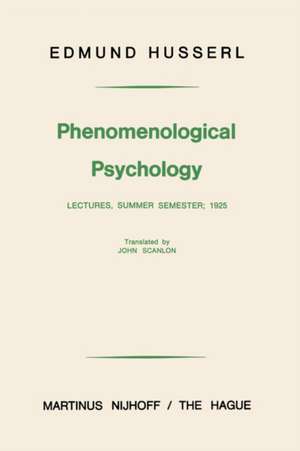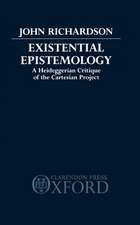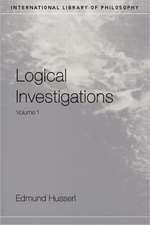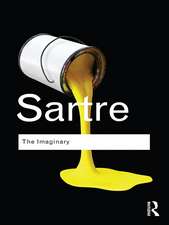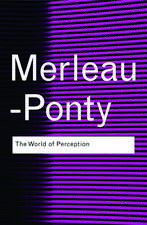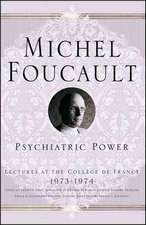Phenomenological Psychology: Lectures, Summer Semester, 1925
Autor Edmund Husserl Traducere de John Scanlonen Limba Engleză Paperback – dec 1977
Preț: 482.56 lei
Nou
Puncte Express: 724
Preț estimativ în valută:
92.34€ • 98.74$ • 76.99£
92.34€ • 98.74$ • 76.99£
Carte tipărită la comandă
Livrare economică 17 aprilie-01 mai
Preluare comenzi: 021 569.72.76
Specificații
ISBN-13: 9789024719785
ISBN-10: 902471978X
Pagini: 204
Ilustrații: XIII, 179 p.
Dimensiuni: 155 x 235 x 11 mm
Greutate: 0.3 kg
Ediția:Softcover reprint of the original 1st ed. 1977
Editura: SPRINGER NETHERLANDS
Colecția Springer
Locul publicării:Dordrecht, Netherlands
ISBN-10: 902471978X
Pagini: 204
Ilustrații: XIII, 179 p.
Dimensiuni: 155 x 235 x 11 mm
Greutate: 0.3 kg
Ediția:Softcover reprint of the original 1st ed. 1977
Editura: SPRINGER NETHERLANDS
Colecția Springer
Locul publicării:Dordrecht, Netherlands
Public țintă
ResearchCuprins
1. The development of modem psychology, Dilthey’s decisive critique and his proposals for a reform (explanatory and descriptive psychology).- 2. The reasons for the limited influence of Dilthey upon his contemporaries: the inadequacy of their understanding and the limits of his beginning.- 3. Task and significance of the Logical Investigations.- a) Critique of psychologism; the essence of irreal (ideal) objects and of irreal (ideal) truths.- b) Researching the correlation: ideal object — psychic lived experiencing (forming of sense) by means of essential description in the reflective attitude.- c) More precise characterization of the reflection decisive for phenomenology (step by step accomplishment of the reflection).- d) Brentano as pioneer for research in internal experience — discovery of intentionality as the fundamental character of the psychic.- e) The further development of the thought of intentionality in the Logical Investigations. The productive character of consciousness. Transition from a purely descriptive psychology to an a priori (eidetic-intuitive) psychology and its significance for the theory of knowledge.- f) The consistent expansion and deepening of the question raised by the Logical Investigations. Showing the necessity of an epistemological grounding of a priori sciences by transcendental phenomenology — the science of transcendental subjectivity.- 4. Summarizing characterization of the new psychology.- Systematic Part.- 5. Delimiting phenomenological psychology: distinguishing it from the other socio-cultural sciences and from the natural sciences. Questioning the concepts, nature and mind.- 6. Necessity of the return to the pre-scientific experiential world and to the experience in which it is given (harmony of experience).- 7.Classifying the sciences by a return to the experiental world. The systematic connection of the sciences, based upon the structural connection of the experiential world; idea of an all-inclusive science as science of the all-inclusive world-structure and of the concrete sciences which have as their theme the individual forms of experiential objects. Significance of the empty horizons.- 8. The science of the all-inclusive world-structure as a priori science.- 9. Seeing essences as genuine method for grasping the a priori.- a) Variation as the decisive step in the dissociation from the factual by fantasy — the eidos as the invariable.- b) Variation and alteration.- c) The moments of ideation: starting with an example (model); disclosure brought about by an open infinity of variants (optional-ness of the process of forming variants); overlapping coincidence of the formation of variants in a synthetic unity; grasping what agrees as the eidos.- d) Distinguishing between empirical generalization and ideation.- e) Bringing out the sequence of levels of genera and gaining the highest genera by variation of ideas — seeing of ideas without starting from experience.- f) Summarizing characterization of the seeing of essences.- 10. The method of intuitive universalization and of ideation as instruments toward gaining the universal structural concepts of a world taken without restriction by starting from the experiential world (“natural concept of the world”). Possibility of an articulation of the sciences of the world and establishment of the signification of the science of the mind.- 11. Characterizing the science of the natural concept of the world. Differentiating this concept of experience from the Kantian concept of experience. Space and time as the most universalstructures of the world.- 12. Necessity of beginning with the experience of something singular, in which passive synthesis brings about unity.- 13. Distinguishing between self-sufficient and non-self-sufficient realities. Determination of real unity by means of causality.- 14. Order of realities in the world.- 15. Characterizing the psychophysical realities of the experiential world. Greater self-sufficiency of the corporeal vis-à-vis the psyche.- 16. The forms in which the mental makes its appearance in the experiential world. The specific character of the cultural object, which is determined in its being by a relation to a subject.- 17. Reduction to pure realities as substrates of exclusively real properties. Exclusion of irreal cultural senses.- 18. Opposition of the subjective and the objective in the attitude of the natural scientist.- 19. The true world in itself a necessary presumption.- 20. Objectivity demonstrable in intersubjective agreement. Normalcy and abnormalcy.- 21. Hierarchical structure of the psychic.- 22. Concept of physical reality as enduring substance of causal determinations.- 23. Physical causality as inductive. Uniqueness of psychic interweaving.- 24. The unity of the psychic.- 25. The idea of an all-inclusive science of nature. Dangers of the naturalistic prejudice.- 26. The subjective in the world as objective theme.- 27. The difficulty that the objective world is constituted by excluding the subjective, but that everything subjective itself belongs to the world.- 28. Carrying out the reflective turn of regard toward the subjective. The perception of physical things in the reflective attitude.- 29. Perceptual field — perceptual space.- 30. Spatial primal presence.- 31. Hyle — hyletic data as matter for intentional functions.- 32.Noticing givenness as I-related mode of givenness of the object.- 33. Objective temporality and temporality of the stream.- 34. Distinction between immanent and transcendent, real and irreal in perception. The object as irreal pole.- 35. Substrate-pole and property-pole. The positive significance of the empty horizon.- 36. The intentional object of perception.- 37. The phenomenological reduction as a method of disclosing the immanent.- 38. The access to pure subjectivity from external perception.- 39. Analysis of perception with regard to the perceiver himself.- 40. The problem of temporality: presenting — retention and protention (positional and quasi-positional modifications of perception and their significance for practical life).- 41. Reflection upon the object-pole in the noematic attitude and reflection upon the I-pole as underlying it. All-inclusive synthesis of the I-pole. The I as pole of activities and habitualities.- 42. The I of primal institutions and of institutions which follow others. Identity of the I maintaining its convictions. The individuality of the I makes itself known in its decisions which are based upon convictions.- 43. The unity of the subject as monad — static and genetic investigation of the monad. Transition from the isolated monad to the totality of monads.- 44. Phenomenological psychology foundational both for the natural and for the personal exploration of the psyche and for the corresponding sciences.- 45. Retrospective sense-investigation.- Selected Bibliography.
